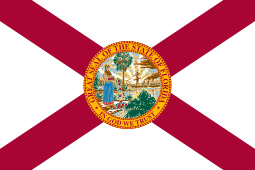Howard Frankland Bridge
The W. Howard Frankland Bridge is the central bridge spanning Old Tampa Bay from St. Petersburg, Florida to Tampa, Florida. It is one of three bridges connecting Hillsborough County and Pinellas County; the others being Gandy Bridge and Courtney Campbell Causeway. The bridge carries Interstate 275 and is by far the most traveled of the bay's bridges.[1][2][3]
W. Howard Frankland Bridge | |
|---|---|
 Eastbound traffic toward Tampa in 2017 | |
| Coordinates | 27.92793°N 82.58755°W |
| Carries | |
| Crosses | Old Tampa Bay |
| Locale | St. Petersburg to Tampa, Florida |
| Other name(s) | Howard Franklin, Frankland Bridge |
| Named for | William Howard Frankland |
| Maintained by | Florida Department of Transportation |
| ID number | 150107 (northbound) 150210 (southbound) |
| Characteristics | |
| Total length | 15,872 ft (4,838 m) (northbound) 15,900 ft (4,800 m) (southbound) |
| Width | 58.4 ft (17.8 m) (northbound) 68.9 ft (21.0 m) (southbound) |
| Clearance below | 43 ft (13 m) (northbound) 48.9 ft (14.9 m) (southbound) |
| History | |
| Opened | 1960 (northbound) 1990 (southbound) |
| Statistics | |
| Daily traffic | 135,000 (2006)[1][2][3] |

| |
The bridge is often incorrectly referred to as the Howard Franklin Bridge.
History

Named for the man who proposed it, Tampa businessman Howard Frankland, the bridge opened in April 1960 and carried four lanes (two lanes in each direction separated by a short, narrow barrier). The bridge and approaches cost $16 million.[4]
Because of the bridge's design, including its lack of emergency shoulders, it proved to be dangerous. Accidents were common on the bridge and traffic backed up on both sides, leading to local nicknames, the "Howard Frankenstein Bridge" and "The Car-Strangled Spanner".[5] In 1962, a steel-reinforced tapered concrete barrier was installed "to prevent cars from hurtling the median and crashing into oncoming traffic." Ten people had already died.[6] The bridge was the subject of a 60 Minutes broadcast in the 1960s noting the below-average construction methods used.
Planning for a larger-capacity replacement began in 1978. Original plans ranged from a large, multi-lane suspension (or similar type) bridge, to two parallel bridges (with the central span reserved for HOV lanes). As traffic projections increased, further exacerbated by a disaster on the Sunshine Skyway Bridge in 1980, it was clear that the new bridge would need to handle at least eight lanes (four in each direction). By 1987, it was concluded that a parallel, four lane span would be built. Plans were also made to rehabilitate the older bridge after the new bridge opened.
Construction began on the new span in 1988. The new $54 million southbound span was opened to traffic in 1990. The older bridge was then closed, rehabilitated, and reopened in 1992. The older northbound span is shorter and has a steeper hump than the newer southbound span.
Bypass system
Before the parallel bridge was built, I-275 utilized a bypass designation system. Whenever there would be a major delay at the Howard Frankland Bridge, special signs would alert drivers to the delay and direct them to utilize the bypass, which ran along SR 694 and across the Gandy Bridge, to the Lee Roy Selmon Expressway, Willow Avenue, Howard Avenue, and ending at Interstate 275. Special shields (marked N and S) along the route made sure that drivers were using the correct thoroughfare.
Reconstruction of the bridge approaches
After the widening project in 1992, Interstate 275 was increased to eight lanes on the bridge itself. However, this did not increase capacity on either end of the bridge. Backups were still seen on the Howard Frankland heading into Tampa, primarily due to a bottleneck at the SR 60/Veterans Expressway exit. On the St. Petersburg side, after a comprehensive reconstruction project that took over ten years, lane counts were increased from four lanes prior to the bridge to six lanes through downtown St. Petersburg, and eight lanes from Gandy Boulevard to the bridge.
A reconstruction project was planned to begin in 2007 for I-275 between the Howard Frankland and downtown Tampa. However, due to rising cost of materials, FDOT planned to reconstruct the interstate in smaller phases rather than the original larger two-phase project and was delayed to 2019. Once the reconstruction project is finished in 2020 or 2021, major traffic congestion on the Howard Frankland is expected to be significantly reduced.[7]
See also



References
- 2006 Average Annual Daily Traffic Counts in Pinellas County (A.A.D.T.) (PDF) (Map). Pinellas County Metropolitan Planning Organization. Archived from the original (PDF) on December 15, 2007. Retrieved January 13, 2008.
- PTMS and TTMS Sites, 2006, Pinellas County (15) (PDF) (Map). Florida Department of Transportation. Archived from the original (PDF) on February 16, 2008. Retrieved January 13, 2008.
- "2006 Annual Average Daily Traffic Report" (PDF). Florida Department of Transportation. pp. Site 0062. Archived from the original (PDF) on February 16, 2008. Retrieved January 13, 2008.
- Franklands to Play Key Role in Bridge Opening St. Petersburg Times, January 15, 1960
- The Francis Scott Key Bridge on the Baltimore Beltway is also derisively referred to as "The Car Strangled Spanner," from which those stopped in traffic can actually see Fort McHenry and the harbor where the national anthem was written by the bridge's namesake.
- Bayway Paving Job to Start in Two Weeks St. Petersburg Times, January 30, 1962
- http://www.baynews9.com/fl/tampa/traffic/2018/04/18/howard-frankland-bridge-traffic-getting-there
External links
- Howard Frankland Bridge page at Interstate275Florida.com
- I-275 plan hits $100M bump Article on the 2006 I-275 expansion setback St. Petersburg Times (June 28, 2006)